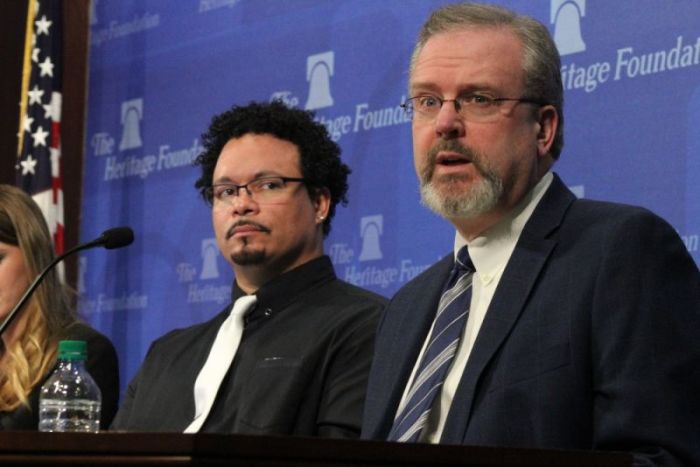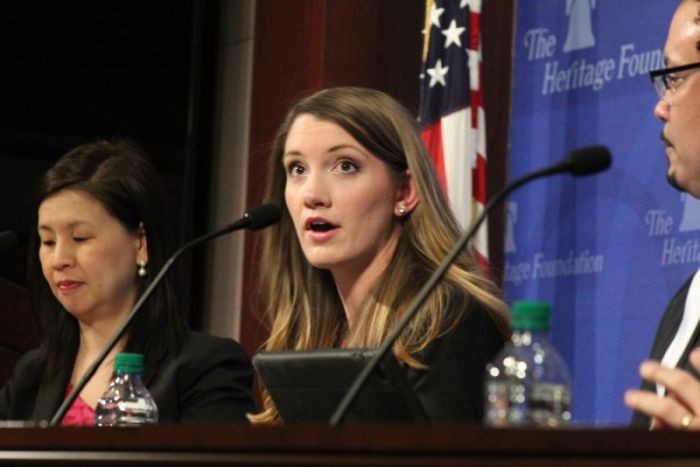Banning Adoption Agencies That Don't Serve LGBT Couples Hurts Foster Kids, Expert Says

WASHINGTON — Efforts to "eliminate" faith-based adoption agencies that don't place children with same-sex couples are "not in the best interest" of kids stuck in the nation's foster care systems, Chuck Johnson, president of the nonpartisan National Council for Adoption, warned Monday.
While Johnson supports allowing LGBT families to adopt, he argued that banning agencies opposed to LGBT adoptions on religious grounds is not in the best interest of foster kids. Allowing faith-based adoption agencies to continue their work wouldn't prevent LGBT families from adopting, because they can use other agencies; it would only reduce the number of agencies providing adoption services, he pointed out.
Johnson spoke at the Heritage Foundation's headquarters during a panel discussion on ongoing efforts to punish faith-based adoption agencies across the United States through state and local policies that bar agencies from discriminating against prospective parents on the basis of sexual orientation.
"We try to avoid the whole conversation about who should adopt because we have concluded accurately that there is no right to adopt," Johnson said during the panel. "Once you start talking about this group adopting or this group not adopting, you really take the focus off children and you begin to focus on the grown ups and the agencies and the organizations."
Johnson noted that his organization — which represents public, private, secular and religious entities — doesn't take a position on the issue of "who can adopt." However, he stressed that with tens of thousands of kids in the United States in need of adoption, the idea of barring agencies with a faith-based mission because of the LGBT issue would only be detrimental for kids and families.
Because of the opioid crisis, Johnson said that that there are as many as 118,000 kids in foster care in the United States in need of adoption. Such a figure is a 14 percent increase from 2012 even though there has been a 10 percent increase in the number of adoptions, he added.
The rise in unadopted foster children comes as faith-based providers in Massachusetts, Illinois, Washington, D.C., and California have had to halt their adoption services in the last decade-plus because of state and local policies preventing agencies from turning away LGBT parents.
Additionally, the discussion comes after the city of Philadelphia last month suspended partnership with two faith-based adoption agencies who refused to place kids with same-sex parents.
"To eliminate faith-based agencies from the field of service over ideology, to take away their licenses, which is happening in states, to prevent them from entering into contracts to provide these services for public entities ..., it is going to end up with seeing fewer resources for children in foster care and children will go unadopted," Johnson warned. "Again, I can't imagine that we would be good with that if it is not necessary."
On the flip side of the issue, Johnson also stressed that many families who are adopting and fostering are from the LGBT community and that eliminating the LGBT community from the adoption picture would also lead to more unadopted children.
However, Johnson stressed that forcing faith-based groups to place children with same-sex parents would not actually provide the LGBT community with a service it is not already receiving.
"When faith-based agencies are allowed to continue to provide these services rather than being forced out, nothing has changed," Johnson said. "Gay and lesbian families clearly have access to other providers since they are adopting and fostering in all 50 states."
Johnson stressed that faith-based agencies have served their populations "for generations" without opposition being raised to their policies.
"When we talk about changing something, when we talk about forcing faith-based agencies out of the arena of providing adoptive and foster care services, I am just not sure how that is in anyone's best interest," Johnson said. "If your position is just to eliminate faith-based agencies from the field of service, how does eliminating them improve foster adoption services? If you can't answer that question, I don't think we need to be having this conversation."

Kelly Clemente, a birth mother from Virginia who faced an unplanned pregnancy at the age of 18, told The Christian Post before the panel that it was crucial for her to be able to seek help and guidance from a Christian adoption organization that could answer the spiritual questions she had.
Growing up in a Catholic household, she said that she felt like God hated her because she engaged in premarital sex. She viewed her 2008 pregnancy as a punishment for her sin. She even at one point laid down in the middle of the road at night waiting for a moving automobile to take her life.
"I was under the impression that I had committed an unforgivable sin. I thought that I was a disappointment. It wasn't enough to send me to a counselor," Clemente told CP. "I needed serious spiritual help. I don't know that a secular adoption agency could have provided me with the spiritual support that I needed to survive that time in my life."
Fortunately, Clemente turned to Bethany Christian Services, where she met a woman named Stacy who was able to listen to her problems and reassure her that God loved her.
"I remember leaving from Bethany knowing that God wasn't angry with me," she said.
Thanks to help from the organization, Clemente has an open adoption with her 9-year-old birth son Alex, who is living a happy life with a mother and a father.
"I made that choice out of love," Clemente said during the panel. "I made that choice because I wanted a mother and a father to raise my unborn child. I didn't know a lot at the time. I was at the lowest point of my life. I was supposed to be a fun sorority girl whose hardest part of her college experience was getting an A in calculus."
Bethany Christian Services was one of the two adoption agencies that had their partnership suspended by the city of Philadelphia last month for refusing to place kids with LGBT couples.
As the American Civil Liberties Union and Lambda Legal have filed lawsuits to try and get faith-based adoption agencies in Michigan and Texas to place children with LGBT couples, legislation has been introduced that would protect the policies of faith-based groups.
The Child Welfare Provider Inclusion Act was introduced in both the U.S. House and Senate.
The bill would prohibit the federal, state and local governments that receive funding for child welfare services from discriminating or "taking an adverse action" against a provider that declines to provide a service on the grounds of religious beliefs or moral convictions.





























